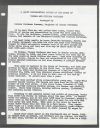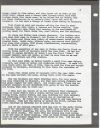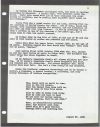Transcript "A Short Biographical Sketch of the Lives of Thomas and William Vardeman"
Arranged by Bonnie Vardeman Conaway, Daughter of Thomas Vardeman
It is meet that we, who gather here today, render this tribute of praise and remembrance to those who have gone before.
We are the children, grandchildren, great-grandchildren, nieces and nephews of two brothers - Thomas and William Vardeman.
We meet today partly to honor Jeremiah Vardeman, fourth son
of Thomas Vardeman, who with his wife has come from Portland, Oregon
to visit us -- partly because some of us have passed our
our three score years and ten, and time may be short when we can
meet with each other.
My father, Thomas Vardeman was born in Shelby County, Kentucky,
October 2, 1838, and four years later on the same day of the same
month my Uncle William was born. They were children of a large family,
reared in fear and admonition of the Lord. They became Baptist
ministers as did also Abraham, a younger brother
of theirs.
They grew to manhood in the State of Kentucky, and both saw
service as Union soldiers in the Civil War. My father enlisted
October 14, 1881 -- was discharged because of a bullet wound,
December 31, 1864, and then rendered eleven additional months of
hospital service. I do not know in what year of the war my uncle
enlisted. He served more than a year.
They were married while comparatively young men. Uncle Will
married Sallie Scarce, who became our dear Aunt Sallie and the
mother of his four girls. A few years later, December 8, 1866,
father married Cornelia Fenwick Gaines, who became our precious
mother. There they farmed, raising various grains, livestock,
and tobacco; mostly tobacco.
Yielding to the general unrest and spirit of progress, Uncle Will
moved his family to Indiana about the year 1876. He farmed
there for awhile, and in the year 1878 came to Missouri, bought
a small farm on the Marshall-Miami road and sent for his wife and
four girls the same fall. They came on the river by boat to
Miami where Uncle Will met them in a farm wagon. They stayed
over night at a crude hotel in Miami experiencing great discomfort,
and the next day proceeded on their journey by wagon to
their new home.
About four years later on the fourteenth day of March, 1882
my father with my mother, six brothers and one sister, his family
at that time, arrived in Marshall. Uncle Will met them in a farm
wagon, drawn by four mules, and they drove out on what is now
North Odell Avenue over a stumpy road through muddy Salt Fork
bottoms where they stuck once, to be helped out by Messrs. Bob
and Henry Irvine -- on to my uncle's farm, north and west of
Marshall. He made a change of homes since coming to Missouri.
They found my aunt and cousins waiting for them in semi-darkness;
their only light, a lantern and tallow candles. They
had broken their lamp flues that morning in the excitement of
getting ready for their Uncle Tom, Aunt Nellie, and the children.
My uncle and father were almost pioneers. The Indians were
gone when they came to Missouri, but flocks of wild turkeys were
in the woods -- and there were plenty of woods -- hazel brush and uncleared
land. Hazel nuts, hickory nuts, and acorns were plentiful;
also wild grapes, wild plums, blackberries, strawberries, and
all kinds of wild game.
With the exception of one year my father and family lived on
various farms north of Marshall until the year 1908. We had increased
to eleven children of which I was the first "Puke." We
younger members were all girls, so that we were then as we are today,
six brothers and five sisters.
In that year 1908, my father bought a small farm near Nelson,
Missouri, and moved my mother and unmarried children. He made his
home there until the fall of 1919, when he sold the farm and bought
property in Marshall, continuing to live there the remainder
of his life.
Uncle Will lived north of Marshall until the year 1920, when
he too made Marshall his home, living there until his death.
The two brothers and their families were, for many years,
the only relatives in Missouri, and they were always friendly and
had great regard for each other. One cousin says, "There was no
greater pleasure in our childhood than going to see the cousins
and having them come to visit us."
I feel sure all eleven of us can reiterate this statement.
Going to Uncle Will's when a child, eating Aunt Sallie's salt
rising bread, yellow butter, and jam, watching her rock serenely
and receiving notice from the cousins was my realization of
earthly heaven. My father and my uncle lived to see many marvels
of science. They saw the laying of almost the first, perhaps
the first railroad in Kentucky and an early one here.
One of the cousins remarked that the roar od the early trains
filled her childish heart with more terror than thoughts of the Devil.
Electric lighting, the auto, the airplanes were in use before
their deaths. The radio with ear phones was just coming in at the
time of their passing. None of these things moved their
faith in God -- rather heightened their faith in Him. Did not God
make man in his own image?
My father did itinerant missionary work, but held no regular
pastorate in Missouri. A cousin says, "The brothers loved the
Bible. Their eyes shone with joy as they discussed the great
truth it contains, and in passing they pillowed their heads on
its promises."
Uncle Will was a great worker for the Lord, serving four rural
churches of Saline County for years. Two of them, Salem and
PinOak, were orgainzed through his efforts, and the influence
of his life and work will live forever. It was my privilege to
attend a service in one of his churches a few years ago, and I
could seem to feel his spirit present.
My father died in the fall of 1923, at the age of 85 and
was laid to rest beside my mother who preceded him two years.
Uncle Will died two years later, October 1925, at the age of
83 years. Pointing upward his last words were "Mommie" (his name
for my aunt), "Heaven."
Aunt Sallie lived until October 1928 when she, too, passed
on and was laid beside my uncle in Ridge Park. The brothers and
their wives lie close together in death.
Of my father's immediate family all eleven children are living.
Of my uncle's immediate family three daughters yet live,
one widowed and two unmarried. His oldest daughter Mrs. Henry
Harvey died last fall. She left a fine family of six children.
Among the brothers' numerous descendants are to be found;
a doctor, a preacher, a school teacher, a policeman, and many
worthy followers of various occupations."
Yes, their work on earth is over,
Only we who yet remain,
Hold the banner they have left us,
May we keep it free from stain.
Side by side in Ridge Park lying
Side by side and head to head
We can hear our Savior saying,
"Only sleeping, they're not dead."
When, on Resurrection morning
They, the trumpet call obey,
There will be a glad reunion
Through God's one unending day.
August 27, 1939 |


















